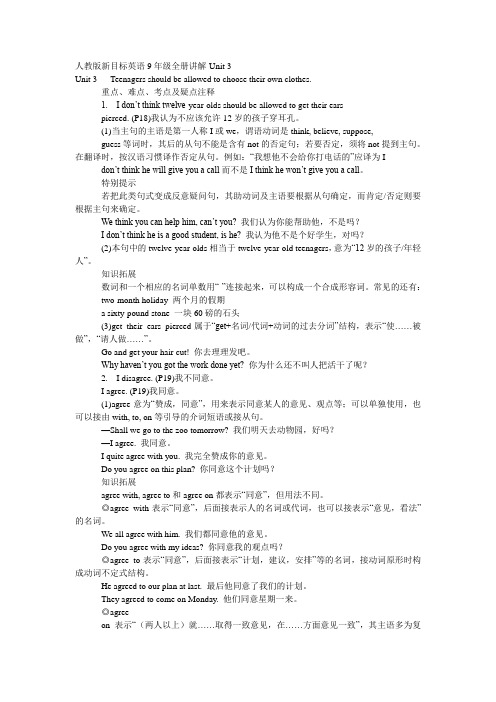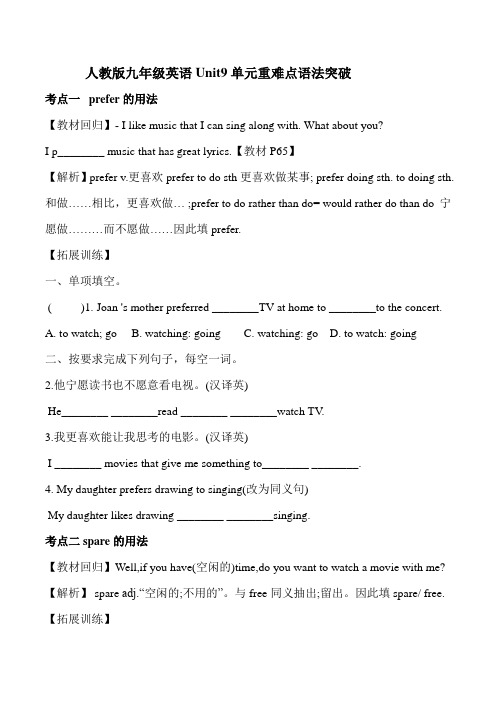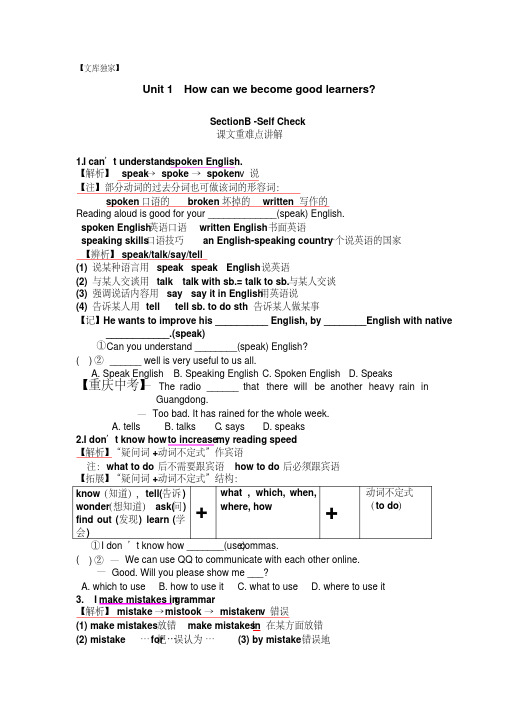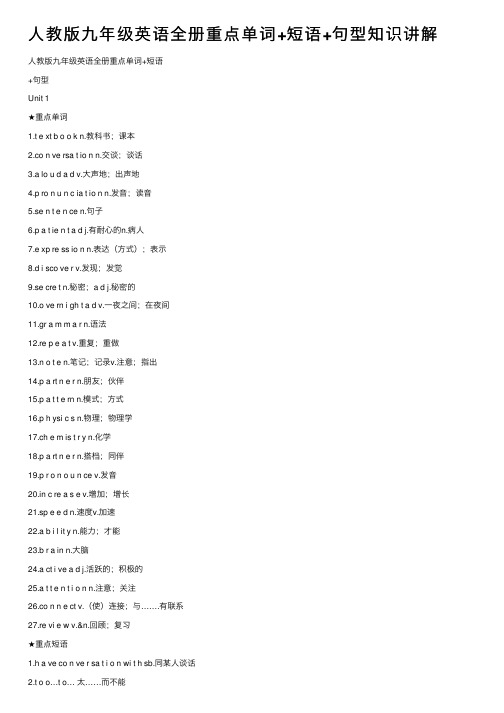人教版九年级英语重难点讲解
人教版九年级英语unit3知识点,单词讲解

人教版新目标英语9年级全册讲解-Unit 3Unit 3 Teenagers should be allowed to choose their own clothes.重点、难点、考点及疑点注释1. I don’t think twelve-year-olds should be allowed to get their earspierced. (P18)我认为不应该允许12岁的孩子穿耳孔。
(1)当主句的主语是第一人称I或we,谓语动词是think, believe, suppose,guess等词时,其后的从句不能是含有not的否定句;若要否定,须将not提到主句。
在翻译时,按汉语习惯译作否定从句。
例如:“我想他不会给你打电话的”应译为I don’t think he will give you a call而不是I think he won’t give you a call。
特别提示若把此类句式变成反意疑问句,其助动词及主语要根据从句确定,而肯定/否定则要根据主句来确定。
We think you can help him, can’t you? 我们认为你能帮助他,不是吗?I don’t think he is a good student, is he? 我认为他不是个好学生,对吗?(2)本句中的twelve-year-olds相当于twelve-year-old teenagers,意为“12岁的孩子/年轻人”。
知识拓展数词和一个相应的名词单数用“-”连接起来,可以构成一个合成形容词。
常见的还有:two-month holiday 两个月的假期a sixty-pound stone 一块60磅的石头(3)get their ears pierced属于“get+名词/代词+动词的过去分词”结构,表示“使……被做”,“请人做……”。
Go and get your hair cut! 你去理理发吧。
[精]人教版九年级英语下册重难点讲解-全
![[精]人教版九年级英语下册重难点讲解-全](https://img.taocdn.com/s3/m/e71b3ea6ee06eff9aff8076b.png)
人教版九年级英语下册重难点讲解Unit 1 How can we become good learners?Section A1. by reading the textbook【解析】watch/read/see/look at "看" 法不同(1)看电视、看比赛、看表演用watch; watch TV 看电视(2)看书、看报、看杂志用read read the book看书(3)看电影、看医生用see see the doctor 看医生(4) 看黑板、看地图用look at look at the blackboard 看黑板【记】______the picture. Can you see the man in the picture? He isn't ________ the book. He is ______TV.2. by asking the teacher for help【解析】ask for 请求,要某物ask sb. about sth 向某人询问关于某事(1)ask sb. for help 向某人请求帮助(2) ask sb. (not) to do sth请求某人做某事【2013北京中考】Our teacher often asks us _____ questions in groups.A. discussB. to discussC. discussingD. discussed3. I study by working with a group. 我通过小组学习。
【解析】by/with/in/on "用" 法不同◆by的用法:(1)by doing sth 通过…方式by studying with a group【注】介词短语作方式状语,回答以How开头的问句,表示"怎样做"。
①I study English by ___________(listen) to the tapes②Tom learns Chinese by ____________(watch) Chinese movies.③-- ____ did you get there? —By ___ a taxi.A. How; takingB. How ; takeC. How; tookD. What; taking(2) by+ 交通工具(交通工具前不能加限定词)by bike by train【by短语】by the way 顺便问一下by accident= by chance 偶然地by mistake 错误地one by one 一个接一个step by step 一步一步地little by little 逐渐地by the end of 到….... 末尾by the time 到……为止by oneself 独自地by and by 不久之后by hand 用手◆with 的用法:表示用某种工具(1) with +工具We like to write with a pen.(2)with+人体部位We see with our eyes.◆in 的用法:通常与"衣着、声音、书写材料"等名称连用in+语言in English 用英语speak in a soft voice◆on 的用法:on +电器或媒介on TV /radio/Internet ( ) The boy was cutting a branch of a tree ____ a knife.A. inB. byC. withD. use4. Do you learn English by watching videos?【解析】learn →learned/learnt→learned/learnt v 学习learn about 了解(1) learn from sb. 向某人学习(2) learn to do sth 学着做某事(3)learn …by oneself= teach oneself 自学①We should _________ ________ the hard- working students.(向……学习)5. What about reading aloud to practice pronunciation?【解析1】用于提建议的句型有:(1)What about doing sth ?=How about doing sth? ….怎么样?(2)Why don't you do sth?= Why not do sth? 为什么不呢?(3)Let's do sth.让我们一起做某事吧。
人教版九年级英语Unit9单元重难点语法突破(含答案)

人教版九年级英语Unit9单元重难点语法突破考点一prefer的用法【教材回归】- I like music that I can sing along with. What about you?I p________ music that has great lyrics.【教材P65】【解析】 prefer v.更喜欢 prefer to do sth更喜欢做某事; prefer doing sth. to doing sth.和做……相比,更喜欢做… ;prefer to do rather than do= would rather do than do宁愿做………而不愿做……因此填 prefer.【拓展训练】一、单项填空。
( )1. Joan 's mother preferred ________TV at home to ________to the concert.A. to watch; goB. watching: goingC. watching: goD. to watch: going二、按要求完成下列句子,每空一词。
2.他宁愿读书也不愿意看电视。
(汉译英)He________ ________read ________ ________watch TV.3.我更喜欢能让我思考的电影。
(汉译英)I ________ movies that give me something to________ ________.4. My daughter prefers drawing to singing(改为同义句)My daughter likes drawing ________ ________singing.考点二 spare的用法【教材回归】Well,if you have(空闲的)time,do you want to watch a movie with me? 【解析】 spare adj.“空闲的;不用的”。
2020人教版九年级英语上Unit1课文重难点讲解

【文库独家】Unit 1 How can we become good learners?SectionB -Self Check课文重难点讲解1.I can’t understand spoken English.【解析】speak→spoke →spoken v说【注】部分动词的过去分词也可做该词的形容词:spoken 口语的broken 坏掉的written 写作的Reading aloud is good for your _____________(speak) English.spoken English 英语口语written English 书面英语speaking skills 口语技巧an English-speaking country 一个说英语的国家【辨析】speak/talk/say/tell(1) 说某种语言用speak speak English 说英语(2) 与某人交谈用talk talk with sb.= talk to sb. 与某人交谈(3) 强调说话内容用say say it in English 用英语说(4) 告诉某人用tell tell sb. to do sth 告诉某人做某事【记】He wants to improve his __________ English, by ________English with native ____________.(speak)①Can you understand ________(speak) English?( )②______ well is very useful to us all.A. Speak EnglishB. Speaking EnglishC. Spoken EnglishD. Speaks【重庆中考】—The radio ______ that there will be another heavy rain inGuangdong.—Too bad. It has rained for the whole week.A. tellsB. talksC. saysD. speaks2.I don’t know how to increase my reading speed【解析】“疑问词+动词不定式”作宾语注:what to do 后不需要跟宾语how to do 后必须跟宾语【拓展】“疑问词+动词不定式”结构:know(知道),tell(告诉)wonder(想知道)ask(问) find out (发现) learn (学会) +what , which, when,where, how +动词不定式(to do)①I don’t know how _______(use) commas.( )②—We can use QQ to communicate with each other online.—Good. Will you please show me ___?A. which to useB. how to use itC. what to useD. where to use it3. I make mistakes in grammar【解析】mistake→mistook →mistaken v错误(1) make mistakes 放错make mistakes in在某方面放错(2) mistake …for… 把…误认为… (3) by mistake 错误地。
英语人教版九年级全册教学目标,重难点,教学流程

by making flashcards.
by reading the textbook.
by making vocabulary lists.
by listening to tapes.
by asking the teacher for help.
by watching English-language videos.
项目
设置
意图
引领学生使用本课的目标语言,解决学习英语中的困难。
教学过程(项目实施——交流展示——评价激励)
教师活动
学生活动
【项目准备】
一、提前布置预习作业,明确要求:
1. 听读Section A的内容,by + doing的用法。
2.课前预习,完成项目纸上的【项目准备】。
【自主完成】
利用课余时间自主完成预习作业2项内容
3.情感态度:通过同学间的学习方法的交流,培养学生与人正确交往和相处的能力,并能取长补短互相学习。
4.学习策略:课前搜集相关信息,通过听力练习提取文本重点语言结构,在与同学交流过程中自主使用本课目标语言,运用本课所学指导自己的学习。小组合作法,做对话
5.文化意识:了解国外学生学习英语的方式,并加以借鉴。
2.文本学习
1)教师呈现和教学句型
Tom looks blue today because there is a big test on Tuesday.He needs some help. Could you tell him how you study for an English test?
教学
重点
To express the ways of learning English by usingby + doing.能够熟练运用句型“verb + by + doing”进行调查和汇报
人教版九年级英语全册重点单词+短语+句型知识讲解

⼈教版九年级英语全册重点单词+短语+句型知识讲解⼈教版九年级英语全册重点单词+短语+句型Unit 1★重点单词1.t e xt b o o k n.教科书;课本2.co n ve rsa t io n n.交谈;谈话3.a lo u d a d v.⼤声地;出声地4.p ro n u n c ia t io n n.发⾳;读⾳5.se n t e n ce n.句⼦6.p a t ie n t a d j.有耐⼼的n.病⼈7.e xp re ss io n n.表达(⽅式);表⽰8.d i sco ve r v.发现;发觉9.se cre t n.秘密;a d j.秘密的10.o ve rn i gh t a d v.⼀夜之间;在夜间11.gr a m m a r n.语法12.re p e a t v.重复;重做13.n o t e n.笔记;记录v.注意;指出14.p a rt n e r n.朋友;伙伴15.p a t t e rn n.模式;⽅式16.p h ysi c s n.物理;物理学17.ch e m is t r y n.化学18.p a rt n e r n.搭档;同伴19.p r o n o u n ce v.发⾳20.in c re a s e v.增加;增长21.sp e e d n.速度v.加速22.a b i l it y n.能⼒;才能23.b r a in n.⼤脑24.a ct i ve a d j.活跃的;积极的25.a t t e n t i o n n.注意;关注26.co n n e ct v.(使)连接;与…….有联系27.re vi e w v.&n.回顾;复习★重点短语1.h a ve co n ve r sa t i o n wi t h sb.同某⼈谈话2.t o o…t o… 太……⽽不能3.t h e se cr e t t o… ……的秘诀4.b e a f r a id o f d o in g st h./b e a f ra id t od o st h.害怕做某事5.l o o k u p查阅6.r e p e a t o u t lo u d⼤声跟读7.m a ke m i st a k e s i n在……⽅⾯犯错误8.co n n e ct……wi t h… 把……和……连接/联系起来9.ge t b o re d感到厌烦10.b e st re sse d o u t焦虑不安的11.p a y a t t e n t io n t o注意;关注12.d e p e n d o n取决于;依靠13.t h e a b il it y t o d o st h..做某事的能⼒★重点句型1.提建议的句⼦:①W h a t/h o w a b o u t+d o in g st h?做……怎么样?如:W h a t/H o w a b o u t go in g sh o p p in g?②W h y d o n't yo u+d o st h?你为什么不做……?如:W h y d o n't yo u g o sh o p p in g?③W h y n o t+d o st h?为什么不做……?如:W h y n o t go sh o p p in g?④L e t's+d o st h.让我们做……吧。
九年级英语下教案人教版Unit 12 You’ re supposed to shake hands 重难点解析1

Unit 12 You’ re supposed to shake hands 重难点解析1[教材全析] 友情提示 SECTION ALanguage Goal:Tell what you are supposed to do.语言目标: 讲一下你应该干什么。
例题探究:He is supposed ________ (ask) what to do. 解析:be supposed to do sth. 答案:to ask1a What do people do when they meet for the first time?Match the countries and the customs.当人们第一次见面时,他们干什么?将国家和其风俗习惯对应起来。
In your country,what are you supposed to do when you meet someone for the first time?在你们国家,你第一次遇见一个人应该干什么? You’re supposed to shake hands. 你应该握手。
1c Talk about what people in different countries do when they meet for the first time.Tell about the countries listed above or other countries you know about.谈论在不同的国家里当人们第一次见面时他们干什么。
谈一谈上面列举的或者你知道的国家。
A:What are people in Korea supposed to do when they meet for the first time?在朝鲜,人们第一次见面应该干什么? B:They’re supposed to bow. 应该鞠躬。
2a Maria is an exchange st night she had dinner at anbe supposed to do sth.应该干某事, 被期望做某事shake hands 握手shake head 摇头 1a 答案:2.b3.a4.b5.afor the first time 第一次, 注意for 的用法:第几次前要用for 。
人教版九年级全一册英语知识点归纳

Unit 1 How can we become good learners?重点:1.学习并掌握用how来询问做某事的方式;2.学习并掌握by+ving来表达做某事的方法。
难点:动名词在句中充当的成分。
知识点:ask for help寻求帮助work with sb.和……一起工作have conversation with和……一起对话main idea中心思想the secret to……的秘诀word by word逐字take time花时间word group词组body language肢体语言expressions on faces脸上的表情key words关键词as well也look up查看take notes记笔记practice doing sth.练习做某事pen pal笔友keep a diary记日记make mistakes犯错increase增加;提高decrease减少;降低practice with sb.和……一起练习depend on依赖whether or not是否pay attention to sth. / doing sth.注意某事/做某事for a long time很长一段时间connect…with…把……和……连接起来write down写下mind map思维导图lifelong journey终身的旅程on one’s own独自地bit by bit一点点at once马上,立刻It’sa piece of cake.小菜一碟。
It serves you right.你活该。
Use it or lose it.Practice makes perfect.Unit 2 I think that mooncakes are delicious!重点&难点:1. that, if whether引导的宾语从句;2.感叹句的学习和运用。
- 1、下载文档前请自行甄别文档内容的完整性,平台不提供额外的编辑、内容补充、找答案等附加服务。
- 2、"仅部分预览"的文档,不可在线预览部分如存在完整性等问题,可反馈申请退款(可完整预览的文档不适用该条件!)。
- 3、如文档侵犯您的权益,请联系客服反馈,我们会尽快为您处理(人工客服工作时间:9:00-18:30)。
I used to be afraid of the dark重点词汇与短语1.terrify使害怕、使恐惧 2. chew咀嚼3.afford买得起 4. cause造成、引起5. chat聊天6. patient有耐心的、忍耐的7. decision决定、决心8. necessary 必须的、必要的9. waste 浪费、滥用10. used to过去常常11. be interested in 对......感兴趣12. be afraid(terrified)of 害怕、恐怕13. on the swim team在游泳队14. with the bedroom light on 开着卧室的灯15. give up放弃16. go to sleep 入睡17. get into trouble with给某人找麻烦18. make a decision下决心19. to one’s surprise令人惊奇的是20. take pride in引以为自豪21. pay attention to注意22. no longer不再课文语法讲解ed?to的用法?:否定形式:usedn’t to do didn’t use to do反意疑问句:usedn’t / didn’t回答:Yes, I used to/ Yes, I did. No, I usedn’t adj: useful / useless adv: usefully/ uselesslya used car= a second-hand car“used?to加不定式”表示过去常常干某事,现在不在干了。
?be?used?to?doing表示习惯于干某事。
?be used to do 被用来做… use…to do…用…来做…be/get used to doing 习惯于做2.be afraid to与be afraid of的用法区别英语语法be afraid of doing担心出现doing的状况、结果。
doing 是客观上造成的,意为“生怕,恐怕”。
3. .be interested in ;interest中考英语重点单词1)?interest作名词。
①意为“兴趣”时,常作不可数名词。
常见短语show?/?have?interest?in?(doing)?sth.,意为“对……表现出?/?有兴趣”。
如: She?showed?great?interest?in?the?meeting.她对这次会议表现出极大的兴趣。
②意为“业余爱好”或“感兴趣的事”时,常作可数名词。
如:He?has?two?great?interests.?One?is?sports?and?the?other?is?music.?他有两大爱好:一个是体育,另一个是音乐。
2).?interested是形容词,常用结构be?interested?in?(doing)?sth.意为“对(做)……感兴趣”,主语是人。
如:John?is?interested?in?history.??约翰喜欢历史。
He?is?interested?in?drawing?pictures.他对画画感兴趣。
3).?interesting也是形容词,意为“令人感兴趣的”,既可以作表语,也可以作定语。
4. terrify vt. 使害怕;使恐惧terrify sbterrifying 可怕的sb be terrified of= be very afraid of be terrified that5. go to sleep 入睡go to sleep 入睡=get to sleep =fall asleepgo to bed 上床睡觉be asleep 睡着了a sleeping bag睡袋; sleeping pills安眠药; a sleeping car卧铺火车6. chat聊天,先谈chatted- chatted Chat with/to sb about sth Chatting room聊天室gossip 八卦短语die of 死于疾病,饥饿,寒冷等内部因素die from 死于(车祸等外部因素)9. afford=have enough time/money to do sth 买得起,负担得起常于can ,could ,be able to连用10. patient n. 病人adj. 有耐心的<==>没有耐心的impatientn. patience<==>impatience do sth with patience = do sth patiently be patient with sb/ at sth eg: I’m always patient with my little dog.11. in the end = at last= finally 最后<==> in the beginningat the end of 在…的末尾,在…末端(时间,空间)<==> at the beginning of by the end of 在...+时间段用于过去完成时/ 将来完成时12. decision n.决定,决心cnmake a decision to do = decide to do = make up one’s mind to do13. necessaryeg: It is necessary for sb to do sth=sb needs to do sth= there is need for sb to do sth.sb find/think/suppose it (is) necessary to do sth.It’s necessary for us to kn ow what we want to be in the future.14. even though (1) = even if 即使,纵然,(2) = although/ though 虽然I can still remember, even though it was so long ago.虽然这是很久以前的事情,我还是记得。
15. no longer 不再已不,No more与瞬时动词连用,表程度不再增加,次数不再重复,no longer与延续性动词或表示状态的词连用,表示时间上的“不再”持续,(过去曾经......,现在不......)。
The baby no more cried=The boy didn't cried any more.(表哭的程度不再增加) He no longer works/lives here.=He doesn't live\work here any longer.(表示过去在这里工作\住,现在不在这里工作\住).{ no more还可表数量上" 和...... 一样不......"常和than 连用,no longer 不行。
A whale is no more a fish than an elephant.(a whale ,a elephaht都不是鱼)It's no more than a kilometre to the school. )}16. take pride in A take/show/feel pride in B = A be proud of B = B be the pride of Ado sth proudly = do sth with pride17. .attentionvi. attend to do sth. = pay (one’s) attention to sth/ doing (to是介词)专心于(做)……to作介词的短语有:be used to doingprefer doing to doinglook forward to doingget down to doingmake a contribution to doing18.give up 放弃,认输give up sth.give it/ them upgive up sth/doing = stop doing= drop doingEven though they were very tired, they didn’t give up discussing the question.19 waste vt. waste sth(time/ money) on sb/ sth waste time (in) doing sthn. a waste of 对于……的浪费课文知识点1. used to do sth. 过去常常做某事否定形式:didn’t use to do sth. / used not to do sth.如:He used to play football after school. 放学后他过去常常踢足球。
Did he use to play football? Yes, I did. No, I didn’t.He didn’t use to smoke. 他过去不吸烟。
2. 反意疑问句①肯定陈述句+否定提问如:Lily is a student, isn’t she?Lily will go to China, won’t she?②否定陈述句+肯定提问如:She doesn’t come from China, does she?You haven’t finished homework, have you?③提问部分用代词而不用名词Lily is a student, isn’t she?④陈述句中含有否定意义的词,如:little, few, never, nothing, hardly等。
其反意疑问句用肯定式。
如:He knows little English, does he?他一点也不懂英语,不是吗?They hardly understood it, did they?他们几乎不明白,不是吗?3. play the piano弹钢琴4. ①be interested in sth. 对…感兴趣②be interested in doing sth. 对做…感兴趣如:He is interested in math, but he isn’t interested in speaking English. 他对数学感兴趣,但是他对说英语不感兴趣。
